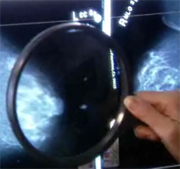
TUESDAY, May 18 (HealthDay News) –A specific grouping of three markers on the surface of breast cancer cells has been linked to a particularly aggressive, but relatively rare form of cancer called “estrogen receptor-negative” cancer, new research reveals.
The finding is considered to be preliminary but the identification of these markers — labelled XIC — could be important because this form of cancer is particularly difficult to treat, the study team notes.
“We are excited but cautious at the prospect that the presence of the XIC markers on [these types of] breast cancer cells may present a selective target for early detection imaging and for personalized therapy,” Barbara K. Vonderhaar, scientist emeritus of the Mammary Biology and Tumorigenesis Laboratory at the National Cancer Institute, explained in a news release.
Vonderhaar and her colleagues report the finding in the May 18th online issue of Cancer Research.
No specific therapies exist that can directly target this type of tumor, the authors note. That means the only means of treatment currently available is generalized chemotherapy, which can kill healthy cells as well as tumor cells and thereby render the option intolerable for some patients.
Vonderhaar and her colleagues were able to isolate the XIC marker cells by testing human breast cancer cells taken from four different patients. They observed that such cells had the ability to form tumors after being injected into the mammary glands of immune-compromised mice.
The research team found that estrogen receptor-negative cancer was present when the three particular markers they uncovered were all present simultaneously.
Down the road, the authors hope to determine whether or not the same XIC marker combination might also similarly identify the more easily treatable estrogen receptor-positive form of breast cancer.
More information
For more on breast cancer, visit Breast Cancer.org.

